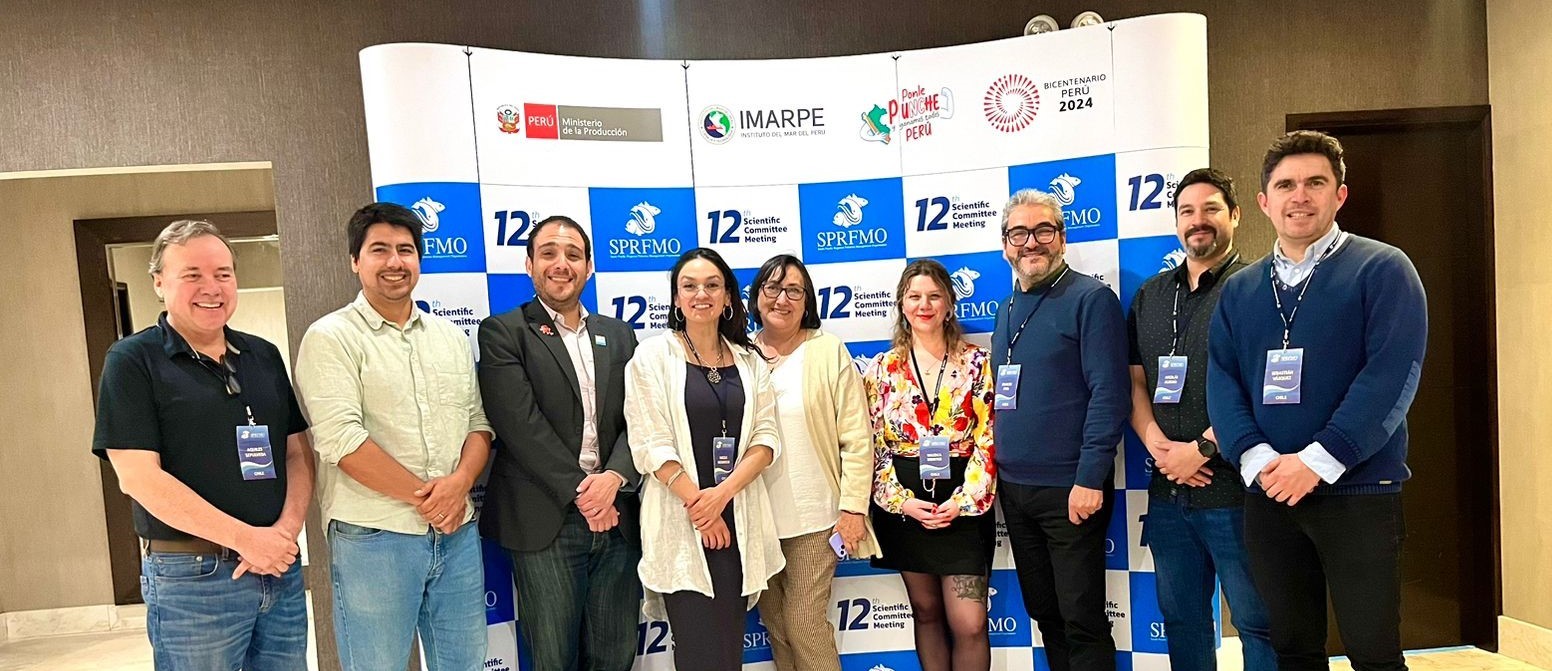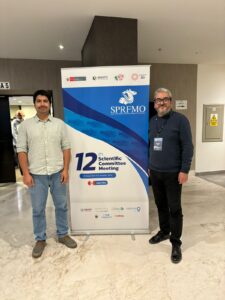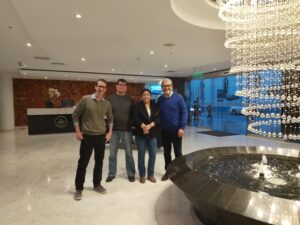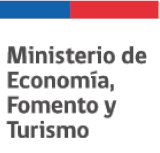
Lima, Peru, September 30 to October 5
 For the third consecutive year, Ignacio Payá, a researcher from the IFOP Resource Assessment Department, was the spokesperson for the Chilean delegation at the XI Meeting of the Scientific Committee (SC) of the South Pacific Regional Fisheries Organization (OROP-PS). The meeting took place from September 30 to October 5 in Lima, Peru. The Chilean delegation was chaired by Aurora Guerrero and was made up of a total of 14 members. Ignacio Payá, who also has the role of Vice President of the Scientific Committee, indicated that the role of spokesperson consists of transmitting, arguing and justifying the scientific position of the Chilean delegation on the different topics of the Scientific Committee, which include: the horse mackerel fishery, the squid fishery, deep-water fisheries, the impact on vulnerable marine environments and the ecosystem approach to fisheries. In the case of the horse mackerel fishery, the main topics were the stock structure, stock assessment, stock status, biologically acceptable catch (catch quota) and progress in the implementation of the evaluation of management strategies. While in the case of the squid fishery, the main topics were the genetics of the different morphs (sizes that the squid reach), fishing effort, relative abundance indices and the different stock assessment models. The IFOP researcher José Zenteno, who served as a reporter for the deepwater fisheries group, also participated in the team of experts advising the delegation.
For the third consecutive year, Ignacio Payá, a researcher from the IFOP Resource Assessment Department, was the spokesperson for the Chilean delegation at the XI Meeting of the Scientific Committee (SC) of the South Pacific Regional Fisheries Organization (OROP-PS). The meeting took place from September 30 to October 5 in Lima, Peru. The Chilean delegation was chaired by Aurora Guerrero and was made up of a total of 14 members. Ignacio Payá, who also has the role of Vice President of the Scientific Committee, indicated that the role of spokesperson consists of transmitting, arguing and justifying the scientific position of the Chilean delegation on the different topics of the Scientific Committee, which include: the horse mackerel fishery, the squid fishery, deep-water fisheries, the impact on vulnerable marine environments and the ecosystem approach to fisheries. In the case of the horse mackerel fishery, the main topics were the stock structure, stock assessment, stock status, biologically acceptable catch (catch quota) and progress in the implementation of the evaluation of management strategies. While in the case of the squid fishery, the main topics were the genetics of the different morphs (sizes that the squid reach), fishing effort, relative abundance indices and the different stock assessment models. The IFOP researcher José Zenteno, who served as a reporter for the deepwater fisheries group, also participated in the team of experts advising the delegation.
Participation in workshops prior to the 12th Meeting of the Scientific Committee of the OROP-PS
Mackerel Connectivity Workshop, Lima, Peru, 26-27 September
 IFOP participated in the Workshop of the Connectivity Working Group of the Jack Mackerel Working Group. This workshop aimed to make progress in developing a research strategy to elucidate the population structure of jack mackerel using the latest scientific tools available. The workshop included the participation of researchers from Chile and Peru, including IFOP researchers Víctor Catasti, Camilo Rodríguez, Ignacio Payá and José Zenteno. During the development of this workshop, the reviews carried out for the eleven research topics selected by the Connectivity Team were presented. Each subgroup presented a review of each topic, which consisted of the compilation of information in the literature on the scientific basis of each discipline, the state of the art in terms of available methodologies, a critical analysis of their application for the determination of connectivity in the jack mackerel population, and an evaluation of the limitations and viability of these methods. A discussion was then held on each topic, where each line of research was assessed in terms of its importance for connectivity, as well as the logistical costs for its incorporation into a research program associated with jack mackerel connectivity. Camilo Rodríguez (Otolith microchemistry) and José Zenteno (Fishing dynamics) presented on behalf of IFOP.
IFOP participated in the Workshop of the Connectivity Working Group of the Jack Mackerel Working Group. This workshop aimed to make progress in developing a research strategy to elucidate the population structure of jack mackerel using the latest scientific tools available. The workshop included the participation of researchers from Chile and Peru, including IFOP researchers Víctor Catasti, Camilo Rodríguez, Ignacio Payá and José Zenteno. During the development of this workshop, the reviews carried out for the eleven research topics selected by the Connectivity Team were presented. Each subgroup presented a review of each topic, which consisted of the compilation of information in the literature on the scientific basis of each discipline, the state of the art in terms of available methodologies, a critical analysis of their application for the determination of connectivity in the jack mackerel population, and an evaluation of the limitations and viability of these methods. A discussion was then held on each topic, where each line of research was assessed in terms of its importance for connectivity, as well as the logistical costs for its incorporation into a research program associated with jack mackerel connectivity. Camilo Rodríguez (Otolith microchemistry) and José Zenteno (Fishing dynamics) presented on behalf of IFOP.
During the development of the workshop, participation opportunities were generated for researchers, within voting schemes by show of hands, which allowed prioritizing the different lines. After successive rounds of voting, the 4 lines of research to be prioritized were determined: Genetics, Marking, Early stages and Reproduction. Finally, all the reviews were compiled into a document and recommendations were agreed to the SPRFMO Commission, which were subsequently presented and approved during the Scientific Committee (SC) sessions.
SPRFMO Jumbo Squid Fisheries and Population Dynamics Simulation Workshop.
Lima, Peru, 27-28 September
 Ignacio Payá, Karen Belmar and José Zenteno from IFOP participated in the SPRFMO SC Jumbo Squid Assessment Simulation Task Team (SPRFMO SC Jumbo Squid Assessment Simulation Task Team) workshop. This workshop aimed to agree on the technical terms of reference for the implementation of a simulation program for the population dynamics and fisheries of squid in the SPRFMO, which will allow testing the robustness of the stock assessment models, and developing operational models for the evaluation of squid management strategies. Simulation scenarios were defined in terms of population and fisheries structure, uncertainty of processes and observations, and incorporation of the effect of the environment and climate change. I. Payá presented the simulation model SQUIDSIM 1.02 (part of his PhD thesis at the University of Barcelona), and it was agreed to use it as the simulation model for the research group.
Ignacio Payá, Karen Belmar and José Zenteno from IFOP participated in the SPRFMO SC Jumbo Squid Assessment Simulation Task Team (SPRFMO SC Jumbo Squid Assessment Simulation Task Team) workshop. This workshop aimed to agree on the technical terms of reference for the implementation of a simulation program for the population dynamics and fisheries of squid in the SPRFMO, which will allow testing the robustness of the stock assessment models, and developing operational models for the evaluation of squid management strategies. Simulation scenarios were defined in terms of population and fisheries structure, uncertainty of processes and observations, and incorporation of the effect of the environment and climate change. I. Payá presented the simulation model SQUIDSIM 1.02 (part of his PhD thesis at the University of Barcelona), and it was agreed to use it as the simulation model for the research group.
Stock assessment workshop for cuttlefish at the SPRFMO.
Lima, Peru, September 29
Ignacio Payá and Karen Belmar participated in the stock assessment workshop for cuttlefish at the OROP-PS, which aimed to analyze the results of the different assessment models used for cuttlefish. I. Payá presented the update of the continuous-time production model (SPiCT) applied to cuttlefish in the entire FAO area’87, which includes the SPRFMO area and the EEZs of Chile, Peru and Ecuador. Dr. Gang Li (China) presented a Bayesian production model with environmental variables. Dr. R. Roa (CALAMASUR) presented a production model adjusted to biome estimates made with zone-based depletion models. The three models presented high uncertainty in their results, but suggest that the stock in 2022 was around the maximum sustained yield. It was highlighted that there is a 2-year delay between the determination of the stock status and the current condition of the resource. This is even more relevant this year, as there has been a decline in cuttlefish sizes and fishing yields in Peru and the equatorial zone. Because of this, the commission was advised to request data from coastal countries and apply an assessment approach within the fishing season.




